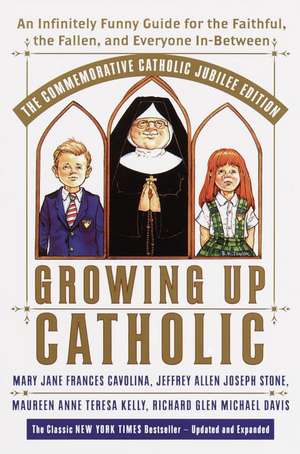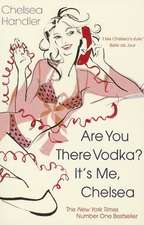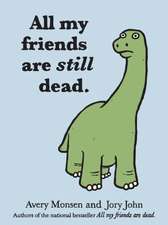Growing Up Catholic: An Infinitely Funny Guide for the Faithful, the Fallen and Everyone In-Between
Autor Mary Jane Frances Cavolina, Jeffery Allen Joseph Stone, Maureen Kellyen Limba Engleză Paperback – 30 sep 2000
Jubilee 2000: Not Your Average Birthday Party
Father Phil: Confessor to the Sopranos
Who Will Be The Next Pope?: A Handicapper's Guide
Ansubstantiationtray: Can't Anybody Here Speak Latin Anymore?
www.holy.com
For Catholics of all ages -- from those who lived through Vatican II to those who've never seen a nun's habit except in a movie -- Growing Up Catholic celebrates in a lighthearted way the funny and sublime side of day-to-day Catholic life.
Preț: 94.88 lei
Nou
Puncte Express: 142
Preț estimativ în valută:
18.16€ • 19.78$ • 15.30£
18.16€ • 19.78$ • 15.30£
Carte disponibilă
Livrare economică 02-16 aprilie
Preluare comenzi: 021 569.72.76
Specificații
ISBN-13: 9780767905978
ISBN-10: 0767905970
Pagini: 240
Dimensiuni: 134 x 204 x 16 mm
Greutate: 0.2 kg
Ediția:Commem Cath Jub.
Editura: IMAGE
ISBN-10: 0767905970
Pagini: 240
Dimensiuni: 134 x 204 x 16 mm
Greutate: 0.2 kg
Ediția:Commem Cath Jub.
Editura: IMAGE
Notă biografică
Mary Jane Frances Cavolina was born in 1954 and grew up in the Bayside section of Queens, New York, where she attended Sacred Heart School. A model student, Jane once received a prayer book for never turning her head during Mass. She attended St. Mary's Girls' High School, where she perfected her understanding of the concept of purgatory, and went on to receive a B.A. Honors degre from Hunter College. Jane is the coauthor, with her sister Ellen Cavolina, of How to Really Watch The Godfather. She lives in Lambertville, New Jersey.
Jeffrey Allen Joseph Stone was born in Providence, Rhode Island, in 1966 and grew up in Westbrook and Gorman, Maine. He was baptized at an Italian parish in Providence, despite the fact that an associate pastor contended that neither "Jeffrey" nor "Allen" was a saint's name. Among his coauthors, Jeff is the only "public"--a public school student who attended CCD classes at a Catholic school on Saturdays and was accused, along with his fellow CCDers, of messing up the parochial kids' desks. Jeff graduated magna cum laude from Brown University in 1977. Now living in New York City, he is a coauthor of Treasures of the Aquarians and What Color Is Your Toothbrush?
Maureen Anne Teresa Kelly was born in 1957 and was baptized at Most Precious Blood Church in Denver. Her first confession was said at St. Pius X Church in Dallas, and she received her first Holy Communion at Holy Ghost Church in Houston. In parochial school she won a glow-in-the-dark plastic Madonna for selling Holy Childhood Christmas Seals and was a member of the Junior Altar Rosary Society, an organization of young Catholic girls dedicated to straightening church pews and dusting kneelers. She went on to St. Agnes Academy in Houston and Randolph-Macon Woman's College in Lynchburg, Virginia. A coauthor of Working in France, she lives in Pittsburgh.
Richard Glen Michael Davis was born in 1953 and was baptized at St. Valentine's Church in Cicero, Illinois. After attending Sacred Heart, St. Elizabeth of Hungary, Mary Queen of Heaven, and Christ the King schools, he graduated from Montini High School--Montini being the surname of Pope Paul VI--and went on to receive a B.A. from the University of Illinois. Richard, who lives in Glendale, California, is a coauthor of Treasures of the Aquarians and What Color Is Your Toothbrush? He has written for the Los Angeles Times magazine, the Los Angeles Times and other publications.
Jeffrey Allen Joseph Stone was born in Providence, Rhode Island, in 1966 and grew up in Westbrook and Gorman, Maine. He was baptized at an Italian parish in Providence, despite the fact that an associate pastor contended that neither "Jeffrey" nor "Allen" was a saint's name. Among his coauthors, Jeff is the only "public"--a public school student who attended CCD classes at a Catholic school on Saturdays and was accused, along with his fellow CCDers, of messing up the parochial kids' desks. Jeff graduated magna cum laude from Brown University in 1977. Now living in New York City, he is a coauthor of Treasures of the Aquarians and What Color Is Your Toothbrush?
Maureen Anne Teresa Kelly was born in 1957 and was baptized at Most Precious Blood Church in Denver. Her first confession was said at St. Pius X Church in Dallas, and she received her first Holy Communion at Holy Ghost Church in Houston. In parochial school she won a glow-in-the-dark plastic Madonna for selling Holy Childhood Christmas Seals and was a member of the Junior Altar Rosary Society, an organization of young Catholic girls dedicated to straightening church pews and dusting kneelers. She went on to St. Agnes Academy in Houston and Randolph-Macon Woman's College in Lynchburg, Virginia. A coauthor of Working in France, she lives in Pittsburgh.
Richard Glen Michael Davis was born in 1953 and was baptized at St. Valentine's Church in Cicero, Illinois. After attending Sacred Heart, St. Elizabeth of Hungary, Mary Queen of Heaven, and Christ the King schools, he graduated from Montini High School--Montini being the surname of Pope Paul VI--and went on to receive a B.A. from the University of Illinois. Richard, who lives in Glendale, California, is a coauthor of Treasures of the Aquarians and What Color Is Your Toothbrush? He has written for the Los Angeles Times magazine, the Los Angeles Times and other publications.
Extras
I Am a Catholic. In Case of Accident, Please Call a Priest
THE BALTIMORE CATECHISM: Basic Training for Young Catholics
THE PROBLEM
How to educate young Catholic minds in the teachings of the Church and give them a solid grounding--a rock, so to speak--on which to build their faith.
THE SOLUTION
Design a book that puts together the most complex theological issues, the greatest mysteries of the faith and the ways and means of performing Catholic ritual, and make it understandable to a seven-year-old, even though most of the greatest thinkers of the ages haven't quite figured it all out. Call it the Baltimore Catechism and make everyone memorize it.
Why is this book called the Baltimore Catechism?
This book is called the Baltimore Catechism because the catechism written in it was discussed in Baltimore.
Where can you get a copy of the Baltimore Catechism?
You can get one free while attending a Catholic grade school, or you can buy a copy in a religious articles store.
How many editions has the Baltimore Catechism had?
The Baltimore Catechism has had many editions, all of which are right and true.
How can you use the Baltimore Catechism?
You can and should use the Baltimore Catechism to lead a good Catholic life and attain Heaven.
What will happen if you do not use what you learn in the Baltimore Catechism?
You will go to Hell.
THROUGH MY FAULT, THROUGH MY FAULT:
The Problem of Sin
Catholicism has more rules and regulations which enable you to sin than any other religion. Our preoccupation with sin is the central difference between us and everyone else. We are consumed with it; and why not? These blemishes on our souls can keep us out of Heaven, put us in Purgatory for aeons, or, God forbid, hurl us into Hell for ever and ever amen. Catholic life, then, is filled with high drama; moral tension is injected into every act.
To begin with, we are born with Original Sin--like factory seconds, slightly imperfect. Baptism wipes Original Sin away, and from then on it's up to us to get our own sins and to get rid of them.
There are two kinds of sin, mortal (the more serious kind) and venial. Committing a mortal sin means knowing that what you are about to do, think, want or say is really bad, but doing, thinking, wanting or saying it anyway. Most of the things we do wrong fall into the somewhat less offensive category of venial sin. Committing a venial sin means doing something that is not really so bad, or doing something really bad that you don't think is really bad or that your heart isn't really into doing. If your little brother is being a pest and you tell him to drop dead, you've committed a venial sin. If you shoot him dead, you've committed a mortal sin.
While on the surface the differences between mortal and venial sin seem obvious, don't be fooled. There is more to this than meets the eye. What is "really bad" and what isn't? And more to the point, who decides?
Let's take a routine situation and note all the possible pitfalls:
You are at a baseball game on a Friday night. You are not supposed to eat meat on Friday. You want a hot dog.
Now, just considering eating meat on Friday is a venial sin; wanting to is another one. You have not moved in your seat and you have already sinned twice. What if you actually ate one? Aside from the risk of choking on forbidden food and receiving your temporal punishment on the spot, have you committed a mortal sin or a venial sin? Well, if you think it's mortal, it may be mortal; and if you think it's venial, it still may be mortal. After much thought, you decide it's venial. You call the hot-dog vendor, you take the money out of your pocket and you buy a hot dog. This is clearly an act of free will. You figure you can go to Confession on Saturday. But wait! Does a venial sin become mortal when you commit it deliberately? That's a chance you take. What if you've forgotten it's Friday? In that case, eating the hot dog may not be a sin, but forgetting it's Friday is. What if you remember it's Friday halfway through the hot dog? Is it a venial sin to finish it? If you throw it away, is wasting food a sin? Within five minutes you have committed enough sins to land you in Purgatory for a million years. The simplest course is just not to take any chances. Avoid the near occasion of sin. Stay out of the ball park on Fridays.
Being a Catholic means fighting a lifelong struggle to avoid sin, mortal or venial. While you don't want to go to Hell, you definitely don't want to rot in Purgatory either. Play it safe. Think about every thought, word, action, desire and omission. Figure that everything you want to do is a sin.
BLESS ME, FATHER
As was to be expected, sometime between last Saturday's confession and this Saturday, you've sinned. You know because you feel guilty. It is time to go to Confession once again. Even though you won't go to Hell if you die with only venial sins on your soul, and you don't think you did anything that bad, it's not worth the risk. Sins are easy to get, but they're just as easy to get rid of.
EXAMINATION OF CONSCIENCE
It is a good idea to examine your conscience before going to Confession. Even if you think the only thing you did wrong this week was to cheat on Mrs. Rostik's science test, confessing only one sin will make the priest doubt your sincerity and will sound like you think you're some kind of saint. Also, as insurance against those sins you may have forgotten or not realized you committed, it can't hurt to throw in a few extra. If you really think about it, you will come up with more.
Although you can examine your conscience in advance, it is better to do it in church before getting in line for Confession. The holy surroundings will make every little thing you did that week seem far worse than they really were, and will assure you of having a good list of things to tell the priest.
When you enter the church, bless yourself with somewhat more piety than usual. You are about to receive a sacrament. Select an empty pew, genuflect solemnly and enter. Go directly into the kneeling position and bury your face in your hands for maximum concentration. Think hard about the past week.
Did you tell your mother to shut up? Yes. Did you hit your dog? Yes. Were you mean to your brothers and sisters? Yes. Did you make a face at Sister behind her back? Yes. If you're really stumped for sins, remember that omission is also a sin. Did you share your lunch with Nicholas when he forgot his? No. Did you help Mrs. Thomas carry her packages home from the store when she passed you playing baseball? No. There is a whole range of "I didn'ts" to choose from. The priest will know that you are very holy for even thinking of these things.
Once you know exactly what you have and haven't done, memorize the list so you won't forget in the confessional. Now go and get in line. Be sure to go to the priest who gives the most lenient penances--look for the longest line.
THE BALTIMORE CATECHISM: Basic Training for Young Catholics
THE PROBLEM
How to educate young Catholic minds in the teachings of the Church and give them a solid grounding--a rock, so to speak--on which to build their faith.
THE SOLUTION
Design a book that puts together the most complex theological issues, the greatest mysteries of the faith and the ways and means of performing Catholic ritual, and make it understandable to a seven-year-old, even though most of the greatest thinkers of the ages haven't quite figured it all out. Call it the Baltimore Catechism and make everyone memorize it.
Why is this book called the Baltimore Catechism?
This book is called the Baltimore Catechism because the catechism written in it was discussed in Baltimore.
Where can you get a copy of the Baltimore Catechism?
You can get one free while attending a Catholic grade school, or you can buy a copy in a religious articles store.
How many editions has the Baltimore Catechism had?
The Baltimore Catechism has had many editions, all of which are right and true.
How can you use the Baltimore Catechism?
You can and should use the Baltimore Catechism to lead a good Catholic life and attain Heaven.
What will happen if you do not use what you learn in the Baltimore Catechism?
You will go to Hell.
THROUGH MY FAULT, THROUGH MY FAULT:
The Problem of Sin
Catholicism has more rules and regulations which enable you to sin than any other religion. Our preoccupation with sin is the central difference between us and everyone else. We are consumed with it; and why not? These blemishes on our souls can keep us out of Heaven, put us in Purgatory for aeons, or, God forbid, hurl us into Hell for ever and ever amen. Catholic life, then, is filled with high drama; moral tension is injected into every act.
To begin with, we are born with Original Sin--like factory seconds, slightly imperfect. Baptism wipes Original Sin away, and from then on it's up to us to get our own sins and to get rid of them.
There are two kinds of sin, mortal (the more serious kind) and venial. Committing a mortal sin means knowing that what you are about to do, think, want or say is really bad, but doing, thinking, wanting or saying it anyway. Most of the things we do wrong fall into the somewhat less offensive category of venial sin. Committing a venial sin means doing something that is not really so bad, or doing something really bad that you don't think is really bad or that your heart isn't really into doing. If your little brother is being a pest and you tell him to drop dead, you've committed a venial sin. If you shoot him dead, you've committed a mortal sin.
While on the surface the differences between mortal and venial sin seem obvious, don't be fooled. There is more to this than meets the eye. What is "really bad" and what isn't? And more to the point, who decides?
Let's take a routine situation and note all the possible pitfalls:
You are at a baseball game on a Friday night. You are not supposed to eat meat on Friday. You want a hot dog.
Now, just considering eating meat on Friday is a venial sin; wanting to is another one. You have not moved in your seat and you have already sinned twice. What if you actually ate one? Aside from the risk of choking on forbidden food and receiving your temporal punishment on the spot, have you committed a mortal sin or a venial sin? Well, if you think it's mortal, it may be mortal; and if you think it's venial, it still may be mortal. After much thought, you decide it's venial. You call the hot-dog vendor, you take the money out of your pocket and you buy a hot dog. This is clearly an act of free will. You figure you can go to Confession on Saturday. But wait! Does a venial sin become mortal when you commit it deliberately? That's a chance you take. What if you've forgotten it's Friday? In that case, eating the hot dog may not be a sin, but forgetting it's Friday is. What if you remember it's Friday halfway through the hot dog? Is it a venial sin to finish it? If you throw it away, is wasting food a sin? Within five minutes you have committed enough sins to land you in Purgatory for a million years. The simplest course is just not to take any chances. Avoid the near occasion of sin. Stay out of the ball park on Fridays.
Being a Catholic means fighting a lifelong struggle to avoid sin, mortal or venial. While you don't want to go to Hell, you definitely don't want to rot in Purgatory either. Play it safe. Think about every thought, word, action, desire and omission. Figure that everything you want to do is a sin.
BLESS ME, FATHER
As was to be expected, sometime between last Saturday's confession and this Saturday, you've sinned. You know because you feel guilty. It is time to go to Confession once again. Even though you won't go to Hell if you die with only venial sins on your soul, and you don't think you did anything that bad, it's not worth the risk. Sins are easy to get, but they're just as easy to get rid of.
EXAMINATION OF CONSCIENCE
It is a good idea to examine your conscience before going to Confession. Even if you think the only thing you did wrong this week was to cheat on Mrs. Rostik's science test, confessing only one sin will make the priest doubt your sincerity and will sound like you think you're some kind of saint. Also, as insurance against those sins you may have forgotten or not realized you committed, it can't hurt to throw in a few extra. If you really think about it, you will come up with more.
Although you can examine your conscience in advance, it is better to do it in church before getting in line for Confession. The holy surroundings will make every little thing you did that week seem far worse than they really were, and will assure you of having a good list of things to tell the priest.
When you enter the church, bless yourself with somewhat more piety than usual. You are about to receive a sacrament. Select an empty pew, genuflect solemnly and enter. Go directly into the kneeling position and bury your face in your hands for maximum concentration. Think hard about the past week.
Did you tell your mother to shut up? Yes. Did you hit your dog? Yes. Were you mean to your brothers and sisters? Yes. Did you make a face at Sister behind her back? Yes. If you're really stumped for sins, remember that omission is also a sin. Did you share your lunch with Nicholas when he forgot his? No. Did you help Mrs. Thomas carry her packages home from the store when she passed you playing baseball? No. There is a whole range of "I didn'ts" to choose from. The priest will know that you are very holy for even thinking of these things.
Once you know exactly what you have and haven't done, memorize the list so you won't forget in the confessional. Now go and get in line. Be sure to go to the priest who gives the most lenient penances--look for the longest line.
Descriere
Now updated and expanded for the new Catholic millennium, the beloved classic bestseller features a witty, poignant, and downright hilarious potpourri of essays, lists, games, drawings, photos, and quizzes. The book highlights the best of all three "Growing Up Catholic" books along with all-new features. 100 line drawings & photos.




